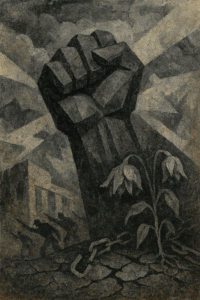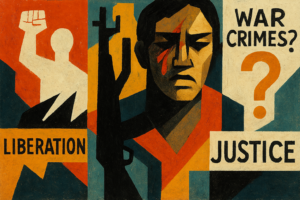
This post has already been read 35 times!
Share the post "Hindus, or other minorities were just mere pawns in Awami League’s political chess board"
During Sheikh Hasina’s 15-year autocratic rule, members of her party, including several ministers and her son Sajeeb Wazed Joy, have frequently used interviews—particularly with Indian media—to suggest that Bangladesh’s Hindu population would face severe threats if Awami League is not in power.
At the same time, Indian media often depict Bangladesh as a nation plagued by ‘fundamentalist’ elements, portraying the Awami League as the ‘savior’ of the Hindu community.
This narrative has continued in Indian media even after Sheikh Hasina’s disgraceful fall following a student-led mass uprising, overlooking the country’s diverse perspectives and complexities. Recently, Sajeeb Wazed has once again amplified this fear-based rhetoric, with misinformation and hyperbole.
Before proceeding further, I want to address two important points at the outset.
Firstly, it is undeniable that the Bangladeshi state has struggled to secure its minority communities. This issue is acknowledged by all political parties, except those on the extreme right.
Various minority groups, including Hindus, Santals, and Ahmadiyyas, have long faced oppression, and recognizing this fact is crucial to our discussion.
Secondly, the recent attacks, often depicted in Indian media as assaults on the Hindu community following Sheikh Hasina’s departure, are primarily targeted at Awami League leaders rather than being driven by the victims’ minority status.
Al-Jazeera has extensively reported that these attacks were motivated more by political affiliations than by religious identity.
Fact-checkers and mainstream media such as Prothom Alo have highlighted that disinformation and fabricated videos about attacks on the Hindu community in Bangladesh are being circulated, including some false videos propagated by Indian news outlets.
Despite this, both the Indian media and Awami League supporters in Bangladesh are attempting to present the Awami League as the ‘lone savior’ or ‘ally’ of Hindus and other minorities. This portrayal is where I have a serious objection.
Understanding this is crucial to see how, while the Awami League positions itself as a ‘protector,’ it is simultaneously engaging in harmful and divisive communal politics with the Hindu community.
Under the pretense of safeguarding minorities, they are not only perpetuating a dangerous narrative of fear and ‘fundamentalism’ but also exploiting it to sustain their communal agenda.
Let’s look at some facts regarding the situation of minorities during the Awami League’s rule.
Numerous attacks on Hindu minorities during AL regime
According to a 2021 report by Ain O Salish Kendra, a leading human rights organization in Bangladesh, there were 3,679 attacks on Hindus between 2013 and 2021.
From January 2013 to June 2024, the organization documented 1,879 attacks on minority temples, shrines, or idols, and 2,190 attacks on businesses and homes, resulting in 958 injuries.
Advocate Rana Dasgupta, General Secretary of the Bangladesh Hindu Buddhist Christian Oikya Parishad, noted in 2021 that although there was initial optimism that attacks would decrease after the Awami League came to power, the situation has actually worsened.
Given these facts and Rana Dasgupta’s observations, it is evident that the Awami League’s tenure has not provided protection for Hindus and other minorities.
While some may question the political affiliations of those responsible for these attacks, a review of the past fifteen years shows that the Awami League has been the most detrimental party to Hindus. This can be illustrated through several case studies:
During Durga Puja in October 2021, severe communal violence erupted in approximately 15 districts across Bangladesh. Many of these incidents involved members of the ruling Awami League or its student wing, the Chhatra League.
For example, Md. Saikat Mandal, who was arrested in connection with the attack on Bara Karimpur Majhipara Hindupalli in Pirganj, Rangpur, was the vice-president of the Chhatra League at Carmichael College.
Similarly, Arian Sajjad, a Chhatra League leader in Chandpur and the son of local Awami League leader Shahida Begum, incited attacks on Hindu temples in response to alleged ‘Quran insults.’ In Bandarban, Awami League leader Zahirul Islam incited a mob to attack a temple
On March 17, 2021, a large group of several thousand people attacked a Hindu-majority village in Shalla Upazila, vandalizing 88 houses and 7-8 family temples during a pre-announced protest rally.
This rally was triggered by a Facebook post from a young man criticizing Hefazat-e-Islam’s Joint Secretary General, Mamunul Haque. The attackers caused widespread destruction and looted extensively.
On October 29, 2016, in Harinber village, Nasirnagar Upazila of Brahmanbaria, a group of youths assaulted a Hindu youth and handed him over to the police, accusing him of insulting Islam on Facebook.
The next day, loudspeaker announcements led to the vandalism, looting, and arson of 15 temples and hundreds of Hindu homes in the upazila. The violence continued, with additional Hindu houses being set on fire on November 4 and November 13.
Media reports later revealed that these attacks were part of a power struggle for control of the Brahmanbaria area, involving Nasirnagar’s MP, Fisheries and Livestock Minister Mohammad Sayedul Haque, Awami League leaders R.A.M. Obaidul Moktadir Chowdhury, and Brahmanbaria Awami League General Secretary Al Mamun Sarkar.
Dewan Atiqur Rahman Ankhi, the Awami League chairman of Haripur Union, was identified as the mastermind behind the incidents. Md. Akhter Mia, the brother of an Awami League leader, and Nasirnagar Sadar Union Chairman Abul Hashem were also implicated.
Despite being named in the chargesheet, all three were subsequently nominated by the Awami League for Union Parishad chairman positions.
Targeting minorities in post-election violence
The Awami League has treated minorities as pawns on a chessboard to advance their own interests, particularly in the context of local and national elections.
On March 22, 2016, elections took place in the Soladana Union of Paikgacha Upazila, Khulna, where the BNP-supported candidate, Enamul Haque, emerged victorious. Following the election, Abdul Mannan Gazi, the Awami League candidate, and his supporters targeted the Hindu community.
Victims reported that Abdul Mannan Gazi and his followers vandalized over five hundred Hindu homes, forcing approximately five thousand men and women to flee their residences. Reports also indicated police involvement in harassing the victims, as covered in the media.
Shahidul Islam Swadhin, arrested by the Police Bureau of Investigation (PBI) as the primary suspect in this incident, was a prominent Union Parishad (UP) member and a leader of the Jubo League, the Awami League’s youth wing.
The case involving the Santals–en ethnic minority– further highlights the Awami League administration’s role in the mistreatment of minorities.
On November 6, 2016, police forces attacked and forcibly evicted Santal families from the Sahebganj sugarcane farm of the Rangpur sugar mill in Gobindganj, Gaibandha, resulting in the deaths of three Santals.
Footage of the incident shows police clashing with the Santals, with officers firing bullets and tear gas near their settlement.
In one part of the video, a policeman in a helmet and bulletproof vest is seen setting fire to a Santal’s bamboo and thatch house, which then spreads to nearby homes. Civilians in plain clothes are also visible in the footage.
An investigation committee formed by the district administration identified Shakil Akand Bulbul, chairman of the local Sapmara Union and president of the Chhatra League, as the mastermind behind the attack.
The report also held the Secretary of the Ministry of Industry responsible for exacerbating the land dispute related to the Rangpur sugar mill.
Despite this, the charge sheet submitted later inexplicably omitted the names of the involved policemen and left out Abul Kalam Azad, the former Awami League Member of Parliament for Gaibandha-4, who was a key figure in the case involving the deaths of the three Santals during the eviction.
Communal Incitement Under draconian law
This case illustrates how the ruling party exploited the Digital Security Act for communal incitement.
In 2022, Pritam Das, who had organized a rally in Srimangal town to advocate for a wage increase for tea workers, became the target of local Awami League leaders and the police.
A ruling party leader sought to discredit Pritam by alleging that he had ‘insulted’ Islam, using a screenshot of an old Facebook post. Given Pritam’s Hindu identity, these accusations quickly gained traction.
The ruling party seized this opportunity to inflame communal tensions by spreading false claims about Pritam.
However, local devout Muslims and some mosque imams intervened to clarify that Pritam had not insulted Islam, which helped to de-escalate the situation.
This intervention thwarted the ruling party’s attempt to organize a procession under the banner of ‘Tawhidi Janata’ after Friday Jumma prayers.
Despite this, local Awami League leaders and activists, with police support, filed a case against Pritam under the Digital Security Act. As a result, Pritam was arrested and imprisoned for 131 days.
Exploiting Minorities Through Manufactured ‘Fear’
These six case studies clearly demonstrate that Awami League leaders and activists were involved in nearly all attacks against Hindus and other minorities. These case studies show that the Awami League was not only complicit in the attacks but also played a role in inciting violence through mob actions.
Despite this, they continued to nominate individuals implicated in these attacks for political positions, though they occasionally had to withdraw these nominations in response to criticism.
The lack of judicial action and the passive stance of the administration are evident in the case involving the Santals.
Furthermore, pro-Awami researchers such as Abul Barakat have documented that many individuals who took over Hindu lands after independence had political ties with the Awami League.
Over the past fifteen years, the Awami League has systematically oppressed Hindus and other minorities while deflecting blame by labeling the entire population as ‘fundamentalist’ or ‘pro-Islamist.’
They have skillfully crafted a narrative of ‘fundamentalism’ to instill fear among Hindus, presenting themselves as the ‘saviors’ protecting Hindus from this so-called ‘fundamentalist’ threat, all while continuing their oppressive tactics. This approach exposes the Awami League’s duplicitous strategy in minority politics.
Following Sheikh Hasina’s downfall, the attempts by segments of the Awami League and certain Indian media outlets to obscure her actions by using the Hindu community as a scapegoat, and positioning Bangladeshi Hindus against the popular uprising, represent a significant danger.
On one hand, they have been persecuting the Hindu community, while on the other, they have been feigning sympathy for Hindus in India immediately after their fall from power—an unscrupulous political maneuver.
Sheikh Hasina and the Awami League are neither friends nor saviors of Hindus and minorities; rather, they may be their greatest adversaries. They have systematically oppressed Hindus during their autocratic regime and are now attempting to turn them against Bangladesh, as evidenced by their rhetoric.
As comrade Sarwar Tusher correctly points out, “Such a plan can only be devised with a serious disregard for the independence and patriotism of the Hindu community in Bangladesh. This treasonous conspiracy by Sheikh Hasina will not succeed.”
Originally Published: Bangla Outlook, 30 Aug 2024
Share the post "Hindus, or other minorities were just mere pawns in Awami League’s political chess board"
This post has already been read 35 times!





